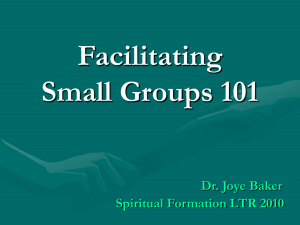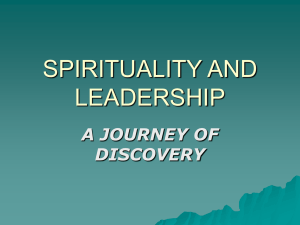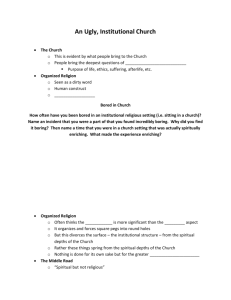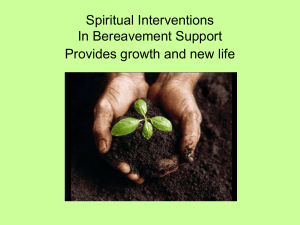Building Spiritual Vitality in Congregations: RenewalWorks
advertisement
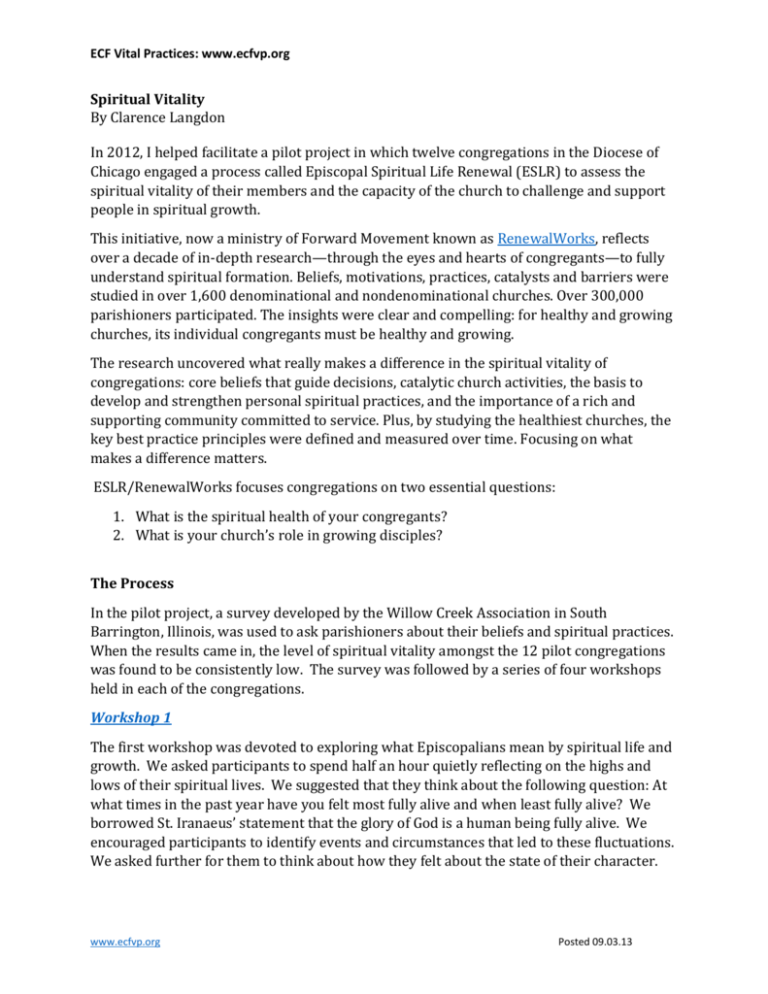
ECF Vital Practices: www.ecfvp.org Spiritual Vitality By Clarence Langdon In 2012, I helped facilitate a pilot project in which twelve congregations in the Diocese of Chicago engaged a process called Episcopal Spiritual Life Renewal (ESLR) to assess the spiritual vitality of their members and the capacity of the church to challenge and support people in spiritual growth. This initiative, now a ministry of Forward Movement known as RenewalWorks, reflects over a decade of in-depth research—through the eyes and hearts of congregants—to fully understand spiritual formation. Beliefs, motivations, practices, catalysts and barriers were studied in over 1,600 denominational and nondenominational churches. Over 300,000 parishioners participated. The insights were clear and compelling: for healthy and growing churches, its individual congregants must be healthy and growing. The research uncovered what really makes a difference in the spiritual vitality of congregations: core beliefs that guide decisions, catalytic church activities, the basis to develop and strengthen personal spiritual practices, and the importance of a rich and supporting community committed to service. Plus, by studying the healthiest churches, the key best practice principles were defined and measured over time. Focusing on what makes a difference matters. ESLR/RenewalWorks focuses congregations on two essential questions: 1. What is the spiritual health of your congregants? 2. What is your church’s role in growing disciples? The Process In the pilot project, a survey developed by the Willow Creek Association in South Barrington, Illinois, was used to ask parishioners about their beliefs and spiritual practices. When the results came in, the level of spiritual vitality amongst the 12 pilot congregations was found to be consistently low. The survey was followed by a series of four workshops held in each of the congregations. Workshop 1 The first workshop was devoted to exploring what Episcopalians mean by spiritual life and growth. We asked participants to spend half an hour quietly reflecting on the highs and lows of their spiritual lives. We suggested that they think about the following question: At what times in the past year have you felt most fully alive and when least fully alive? We borrowed St. Iranaeus’ statement that the glory of God is a human being fully alive. We encouraged participants to identify events and circumstances that led to these fluctuations. We asked further for them to think about how they felt about the state of their character. www.ecfvp.org Posted 09.03.13 ECF Vital Practices: www.ecfvp.org We asked when they had felt most satisfied and least satisfied with their character and to identify events that led to these changes in their self-perception. After thirty minutes of private reflection, people gathered in groups of 6 and shared what they had concluded. We asked the groups to spend an hour discussing these questions and when the time was up we had difficulty getting them to stop talking. The energy level in the room was observably elevated from where it had been when we began. Next, we presented to the group a framework and continuum for assessing spiritual growth developed by the Willow Creek Association. This continuum moves from exploring a relationship with Christ to growing in that relationship, to being close to Christ, and ultimately being centered in Christ. Each step on the continuum is associated with particular beliefs and practices that have been identified through analyzing the results of thousands of people who have taken the survey. The big learning from our first workshops were that those who attended were eager to have this conversation – and that many of these faithful Episcopalians did not have a language to speak of their spiritual lives. The conversation then moved to the basic questions, “what do we mean by spiritual life and spiritual growth?” We settled on a definition that I learned from The Rev. Brian C. Taylor of St. Michael & All Angels Episcopal Church in Albuquerque, New Mexico, “The essence of spiritual life is relationship, especially our relationship with God, ourselves, other people, and the world around us.” Growing in the depth and vitality of these relationships suggests that we are maturing spiritually. This growth can be thought of as the fruit of our spiritual beliefs and practices. As St. Paul taught, we plant and water and God gives the increase. To help people better understand and speak with each other about their spiritual lives I compiled “Episcopal Beliefs and Practices,” (EBP) a brief summary of my understanding of the beliefs and practices contained in the Book of Common Prayer and other resources from our tradition. The groups generally responded very favorably to EBP and we have made it a part of the materials provided for the workshops. Workshops 2-4 After the first session dealing with the dynamics of spiritual life, the workshops proceeded to: Workshop 2: An in-depth examination of the survey results and other parish statistics, Workshop 3: A review of what the congregation is presently doing that supports spiritual growth www.ecfvp.org Posted 09.03.13 ECF Vital Practices: www.ecfvp.org Workshop 4: Next steps that can be taken to make the congregation a greater resource to its members in developing their own spiritual lives. The whole process follows the belief that vital congregations are made up of spiritually vital people, and that our churches will be more vital when we become better resources and coaches for our people. In my follow up conversations with clergy who have participated in ESLR, I have been told that the experience had the greatest impact on her spiritual life of anything she has done since being ordained. Another said ESLR has helped shape a vision and strategy that will guide his ministry for the concluding five years before his retirement. Another said that while the process had been difficult for his congregation, it had fundamentally changed the conversation about the mission of the parish in a very positive way. In a nutshell, ESLR has helped shift the conversation from concern about what is happening to church attendance to attention to what is happening to the spiritual lives of our people. This pilot project was underwritten by the Episcopal Diocese of Chicago, Seabury Western Seminary, a grant from the Lilly Endowment and Church of the Holy Spirit in Lake Forest, Illinois. The Rev. Jay Sidebotham, former rector of Church of the Holy Spirit, is now the executive director of RenewalWorks. Thirty congregations from around the country have engaged the process and there will be opportunities for other congregations to enroll for fall 2013 and then again in the spring of 2014. The Rev. Dr. Clarence M. Langdon is associate for leadership development for the Diocese of Chicago. Before joining the bishop’s staff, Clarence served in parish ministry for 40 years, the last 25 years as rector of St. Mary’s Episcopal Church in Park Ridge, Illinois. He administers Making Excellent Disciples, a mentoring program for newly ordained clergy, and consults for RenewalWorks, a process for assessing and addressing congregational spiritual vitality. Clarence is a graduate of Northern Colorado University and the General Theological Seminary in New York City (GTS) and received a DMin from McCormick Theological Seminary in Chicago. Clarence has been an Episcopal priest since 1962, celebrating 50 years of ordained ministry in 2012. Resources “Forward Movement Launches RenewalWorks, a Center for Spiritual Growth” http://renewalworks.org/2013/05/forward-movement-launches-renewalworks-a-centerfor-spiritual-growth/ Renewal Works www.renewalworks.org www.ecfvp.org Posted 09.03.13

